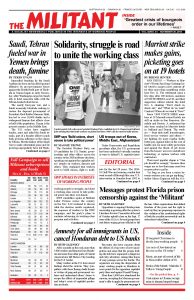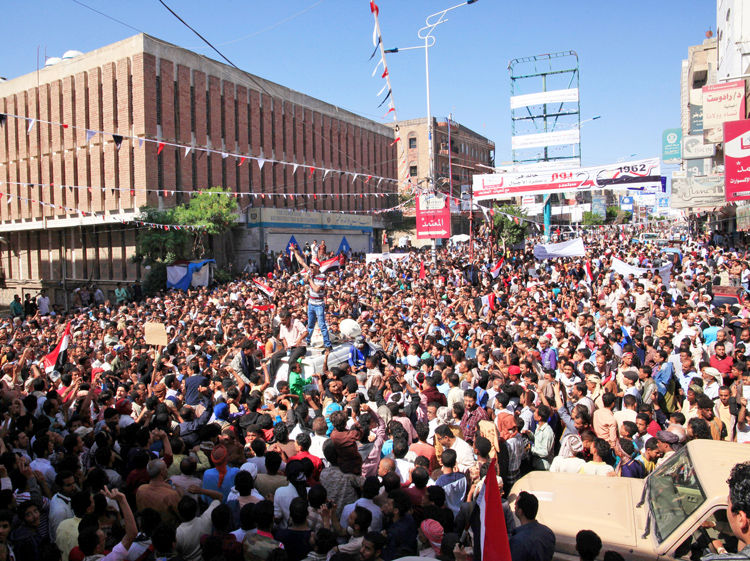Intensified bombing by the Saudi Arabian air force and an allied ground offensive by pro-government forces against the Houthi-held port of Hodeida in Yemen began in early November, after Washington urged its Saudi ally to hold cease-fire talks with the Tehran-backed rebel forces.
The nearly four-year war, and a Saudi monarchy blockade seeking to restore the deposed government of President Abed Rabbo Mansour Hadi, has led to over 10,000 deaths and a widespread famine that affects close to half of the population. Yemen is the poorest country in the Middle East.
The U.S. rulers have supplied bombs, arms and aided the Saudi attacks, part of a broader effort to push back growing influence in the region by Tehran. But the failure of the Saudi war to make substantial gains and its growing unpopularity have led Washington to call for a truce. Both Secretary of Defense James Mattis and Secretary of State Mike Pompeo recently said the Saudis should press for a cease-fire.
Since 2015, 3 million Yemenis have been forced to flee their homes and some 14 million are gripped by famine. The ongoing fighting has brought production in the country’s three oil fields, a key source of income, to a virtual halt. Fuel shortages disrupted the operation of water treatment plants, leading to an outbreak of cholera affecting over 1 million Yemenis.
Hundreds have been killed by Saudi airstrikes in Hodeida. Many of the city’s 600,000 residents had fled the fighting over the summer. Now a growing number of roadblocks erected by combatants on both warring sides are preventing people in the town from escaping. The fighting has raged near the main hospital complex there, one of the few in the country, threatening any treatment for those suffering from wounds, disease or famine.
Hodeida is the entry point for some 70 percent of all the country’s food and aid imports. The fighting obstructs the supply of basic necessities to millions of Yemenis.
The Saudi rulers say they agree on the need for a truce. But it’s obvious from the new Hodeida offensive that they hope to improve their position in talks by seizing the key port before any cease-fire.
Break up of imperialist order
The roots of the current war are tied to the broader unraveling of the imperialist order across the Middle East. The U.S. capitalist rulers lost a central pillar of imperialist rule in 1979 when a popular revolution overthrew the shah of Iran, Washington’s key ally in the region. A cleric-led capitalist counterrevolution arose, pushing back against the deep-going social revolution. As workers turned to fight against a U.S.-backed invasion by the Iraqi regime of Saddam Hussein in the early 1980s, the counterrevolution consolidated its power. But these forces were incapable of completely crushing working-class opposition. This was reflected in sizable protests earlier this year against Tehran’s wars and the social crisis affecting Iranian toilers.
Since 1991 Washington has waged wars in Iraq, Afghanistan and elsewhere, acting on the mistaken belief that it had won the Cold War after the collapse of Stalinist rule and the breakup of the Soviet Union. The U.S. rulers’ seemingly unending wars since have deepened instability across the region.
A popular upsurge that erupted against the dictatorship of Bashar al-Assad in Syria in 2011 was put down by murderous repression, leading to a seven-year civil war. The lack of working-class leadership led to the rise of Islamic State and social catastrophe for millions. At the same time the Kurdish People’s Protection Units (YPG) fought IS to take control of the Kurdish region in Syria. Moscow intervened with its air power, and Tehran and its ally Hezbollah sent ground forces to assist Assad in re-establishing control over a good part of the country.
Today Washington, Moscow, Tehran and Ankara, as well as Saudi Arabia and the other capitalist rulers in the region, are locked in conflicting efforts to defend their national interests in the area. The U.S. rulers have looked to the Saudi monarchy as a key ally in their efforts.
Washington under both Donald Trump’s White House and the Democratic administration of Barack Obama have backed the current Saudi-led coalition in Yemen. They would like this coalition to succeed in establishing a reliable allied government there, to create stable conditions for capitalist interests, and above all help push back Tehran’s influence.
Saudis’ outmoded social relations
The Saudi monarchs increasingly have seen that the historically outmoded social relations they rule over are a serious obstacle to their ability to compete effectively against Tehran. They have taken steps to reduce their reliance on oil rents, accelerate industrial development and have relaxed some of their oppressive restrictions on women’s rights.
Riyadh is determined to prevent the Tehran-backed Houthis from consolidating control over areas in Yemen that border Saudi Arabia. But the Saudi army is largely untested in combat. Instead, Riyadh relies on pro-Hadi Yemeni forces on the ground and its own deadly airstrikes.
In addition to Hodeida, prolonged fighting has shaped life in the southwestern city of Taiz, where the Houthis have laid siege. They’ve restricted aid deliveries and shelled residential areas.
“The Saudis promised they would recapture the whole country in two weeks,” Ahmed al-Masani, an unemployed market worker, told Middle East Eye. “Instead, they led the country towards famine.” Al-Masani was interviewed as he joined several thousand others in Taiz Oct. 5 to demonstrate against the Saudi rulers’ intervention and the ruinous conditions created by the war.


